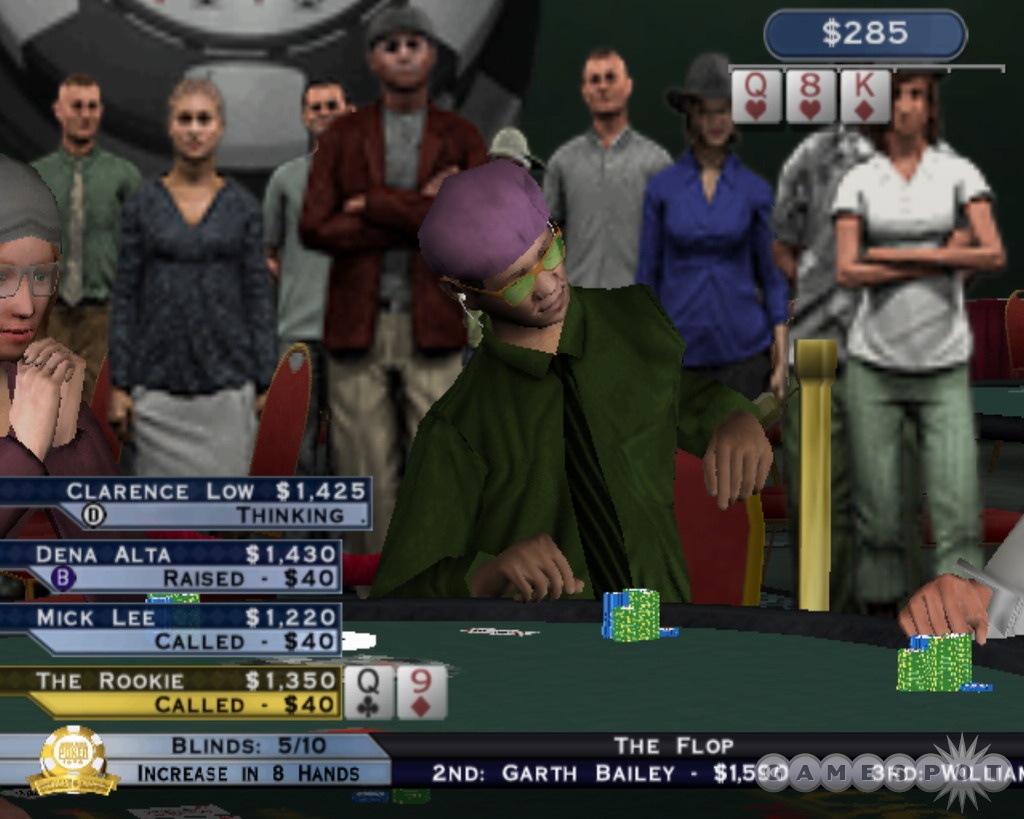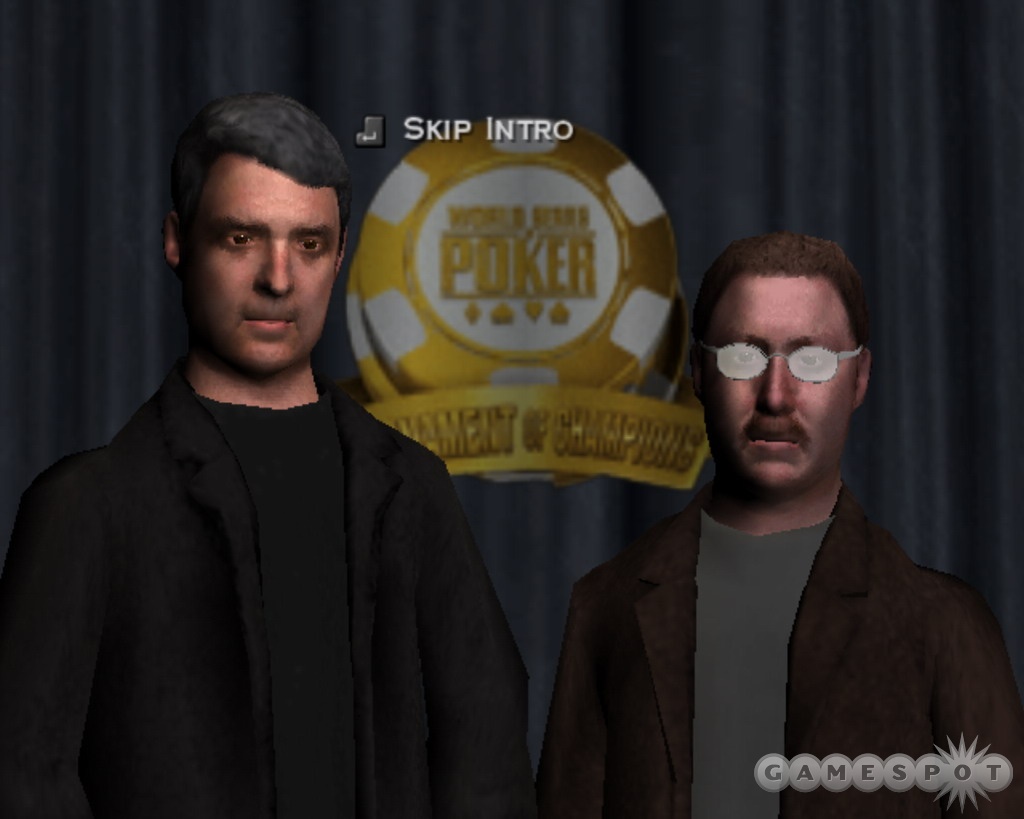The 2006 World Series of Poker has come and gone, with no-name TV producer Jamie Gold taking the $12 million dollar top prize. But soon enough the WSOP Tournament of Champions will find its way to ESPN, and alongside it you'll find World Series of Poker: Tournament of Champions for the PC. Like the regular World Series, this is a series of tournaments where players earn points and try to make their way into a final tournament to take home a huge cash prize. Much like Activision's previous attempt to turn the World Series into a video game, Tournament of Champions does a serviceable, if unremarkable, job of emulating the event. This year's game does put a greater emphasis on its included pro players, and the online multiplayer is certainly a draw, but the offline play is still a bit mundane, thanks to off-kilter artificial intelligence and awful presentation.

Like with last year's game, the focus of Tournament of Champions is its career mode. You begin by creating a character, as you do in most poker games. This process is pretty by-the-numbers. There are a decent number of facial and clothing customizations to choose from, and they aren't all crazy and over-the-top like some poker games tend to get with their created players. The basic progression of events in the career mode is simple. You start out at a home game against a few generic guys, but lo and behold, your dealer for the night is Chris "Jesus" Ferguson. It seems Mr. Jesus has lost some kind of bet and is now at your home game, scouting for talent to take to the WSOP Tournament of Champions. Whether you win or lose this game, Jesus takes you under his wing and sets you on the path to poker riches. There are four casinos with four events each for the preliminary rounds, and then there's the final round at the Rio in Las Vegas. You try to earn points in the various preliminary tournaments to move from one to the next. Wins give you more points and cash, but you can earn points just by placing in the final table rankings at each tournament.
Along the way, you'll encounter a variety of pro players, including Scotty Nguyen, Men Nguyen, Antonio Esfandiari, Phil Laak, Jennifer Tilly (yes, the Jennifer Tilly), TJ Cloutier, Kristy Gazes, Clonie Gowen, Andrew Black, and, of course, last year's champion, Joe Hachem. Each of these pros provides some at-the-table dialogue, though it doesn't consist of more than a few token barbs during and after a hand, as well as a few generic "check" and "I raise" statements.
The pros also don't play much like their real-life counterparts. Joe Hachem may say, "Pass the sugar, baby!" from time to time, but you don't get the same flair from his actual play. All the AI opponents play functionally the same. You'll notice that some AI players play fewer hands than others, but that's about the only difference. On the surface, the player AI is reasonably intelligent, if rather robotic. However, there are some issues with overaggressive betting, especially before the flop. It's rare to see a table's worth of players fold around completely to a raise before the flop. You'll see a bunch of reraises, even if the other players don't have anything better than a king-eight off-suit. Table position doesn't seem to play into this. Once the flop comes, it's easier to bully players out by raising heavily, but if an AI player makes a hand of any kind, he or she won't quit unless you try to put the player all-in.
Tournament of Champions isn't a good poker teaching tool in the way that, for instance, Stacked was. The game's load screens do occasionally toss you some decent nuggets of info that might be useful to new players, but in-game, the tips that scroll across the screen are beyond obtuse. "Poker is a game of position," says Chris Ferguson. Gee, thanks, Jesus! However, one thing the game does offer that might be useful for non-video-game poker play is a tool that unlocks once you've played a decent number of hands. By pressing a button, you can bring up a menu that shows you a wealth of statistical data, such as what your pot odds are, based on the number of people already in the hand; the odds of making a specific type of hand, based on what you have versus what's on the board; which cards are your outs; and the percentage of hands you have played in and raised prior to the flop. For those who find the more mathematical aspects of poker dizzying, this handy little tool gives you a better idea of where you stand. It won't win hands for you, but it might keep you from losing a few.
Most poker games live and die by their multiplayer components, since poker is inherently a game best played with live people. The PC version contains the same suite of multiplayer modes as the console versions, with online multiplayer for up to nine players. Hosts can set up sit-and-go tables, as well as multitable tournaments, and you can play any of the available games, including hold 'em, Omaha, and several other basic poker variants. As tends to be the case with online poker, the game is slow-moving. Offline you can use speed settings to blaze through hands, but no such option presents itself with live players, so you may find yourself in a number of long, drawn-out games. But if the slowness doesn't bother you, then you'll find the online play pretty good and basically lag-free.
What drags Tournament of Champions down the most is its presentation. It's tough to make an exciting-looking game of poker, considering that players at a poker table don't do much beyond shifting around in their chairs and occasionally screaming wildly when they lose or win a big hand. The basic in-game graphics aren't terrible, though they're fairly bland, and the game lacks the dynamic presentation of one of the TV poker broadcasts. You'll also notice some ugly clipping issues with character models from time to time. However, the most atrocious issue is the PC's default resolution, which is insanely low, and there doesn't seem to be any option to change it. So what you end up with is a blurry, jaggy mess that looks like the PSP version of the game blown up to epic proportions.
The PC version has some other annoying quirks to it, as well. The game won't load when you first install it because a DirectX 9 driver is missing. There's a DX installer on the disc, but it still never installs the correct driver, so you have to go track down the right driver on the Internet before the game will even play. Another issue has to do with the game's lack of control options. If you have a USB gamepad plugged in, the game defaults to that. However, with every gamepad we tried, only two of the buttons worked and neither the directional buttons nor the analog sticks could be used to sort through menus, meaning you basically can't do anything. You also can't use keyboard commands with a gamepad plugged in. So, basically, don't try and play this game with a gamepad, because it doesn't work.

The audio presentation is pretty unpleasant, as well. Though the developers did at least go to the trouble of getting both Lon McEarchen and Norman Chad this year, they didn't give them anything to do. They have maybe a couple of dozen lines apiece, and both repeat often. Norman doesn't have many of his trademark jokes available, and Lon's play-by-play is badly stitched together, with lots of instances of horrible shifts in voice tone and volume coming at random. The pro player dialogue is at least delivered pretty well. Otherwise, a lot of background casino noise and generic, slide-guitar-heavy music occupies the menu screens.
We're at a juncture now with poker games, where providing a decent online mode and a lengthy career mode isn't quite enough to sell an entire package. With games starting to step it up in the AI category, it's time for all poker games to get smarter and not rely on the same robotic AI routines that don't emulate how people really play. And as far as presentation goes, it's not enough to just trot out a bunch of pro players, some licensed commentators, and camera support and call it a day. There's no shortage of games with similar features on the PC, so it's hard to look at this one as anything beyond another middle-of-the-road entry for the genre. You won't necessarily go wrong by checking out Tournament of Champions, but there are smarter, deeper, and considerably better looking games available elsewhere.